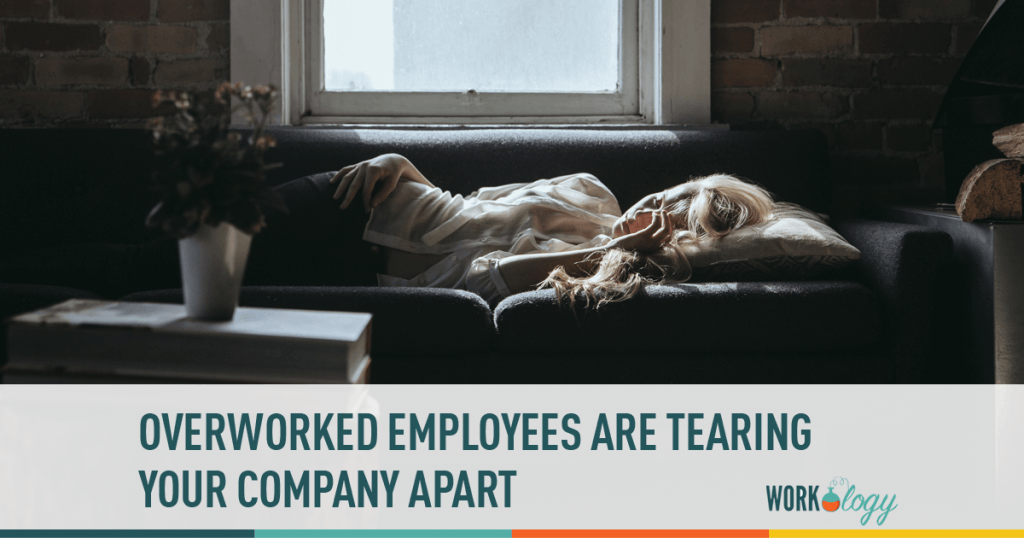Overworking seems to be an epidemic in the U.S. These days, any conversation about work seems to include talk of long days and high stress levels. Whether it is long hours at the office or catching up on email from home at night, our jobs are taking over our lives often leaving many people to feel overworked. How can you tell if you are overworking your employees, and what can you do to change that?
What is overworked?
In the U.S., we usually refer to a typical workweek as 40 hours; however, according to a 2014 Gallup poll, 50% of Americans said on average they work more than 40 hours per week. The poll also indicated that the average workweek is 47 hours per week and that 25% of salaried employees say they average at least 60 hours per week.
The feeling of being overworked can bring stress, anxiety, burnout and more. When work consumes us at that level, it is nearly impossible to achieve any kind of work-life balance. Being overworked to the point where a job takes over an employee’s personal life may lead to feelings of resentment toward an employer and a supervisor. These are not exactly the qualities we want in our star employees.
The definition of what overworked is may vary from employee to employee and business to business; however, in general, being overworked means time at the office is making your employees fatigued, stressed and worn out due to heavy workloads and long hours spent at work.
Signs of your employees being overworked
There is this myth that putting in long hours means a person is a productive employee. In reality, we all reach a point where more hours means we become less productive. We have little work life balance in our lives. I have seen this point in myself as well as employees pushed beyond a reasonable number of hours. When we work long hours or are given impossible to-do lists, it affects our ability to do a good job and to manage our time well.
Overworked employees are also at risk for stress-related illnesses. Most of us have probably experienced losing sleep over work stress, headaches related to stress and other issues. Stress can also lead to an increased risk of things like obesity, diabetes, heart disease and depression.
Employees who are overworked are often irritable and angry. At one company I was at, this became really obvious as the expectation of long hours became standard business. As the number of hours people put in at the office increased, the rate of employees snapping at each other also increased. There was no balance work or life from any of our employees.
Changing the workplace
I do not think we need to accept that being overworked is just the way of the world. As employers and HR professionals, we have an obligation to create healthy workplaces for our employees. This means recognizing the signs of being overworked and making changes for employees. This may mean shifting tasks around or hiring another employee.
We also need to lead by example and not put in long hours ourselves. When an employee sees the boss at their desk well into the evening, they will assume that this is what the expectation is. When you notice an employee’s emails are all from late at night, speak to the employee and let them know that email can wait until the next day.
Generous time off policies are also a good way to relieve the symptoms of overwork. We all need time to refresh and recharge, and we cannot do that if we are working 50+ hour weeks without a break.
Most importantly, we need to remember that not everything is top priority. We need to give our employees permission to prioritize and not treat everything as though it has to be handled NOW. Sometimes it is OK to leave it until tomorrow.










3 Comments
There are more and more overworked employees nowadays, and all believe that staying more hours at the office can help them prove they are the right person for the job. Unfortunately, this unhealthy behaviour is promoted by the manager. It is true that there are exceptional situations that require no delay, but they do not occur on a daily basis. Furthermore, the negative effects of tiredness can affect the company in the long run.
Thanks for your comment. I think the recent story about Amazon is a good example of how overwork can negatively affect employees. Managers and companies who encourage this kind of overwork culture say it leads to innovation, but at what cost?
overworking has bad results and is costly for both employee and company .It result into staff getting sick and often abstaining from work on sick leave . The service that was supposed to be rendered by the sick employee will be unavailable and that will give suspicion to the customer if will be lucky for the service required the following day or not . The customer in question will think of trying somewhere first, and should she/he be lucky to find service there( as employees are always available owing to fair working standard), the customer will start to prefer business A than B and also recommend A to friends and relatives who will also do the same(each one teach one). That will make company B to suffer . Let alone when the sick or dead employees relatives claim compensation from the company that overwork employees .(should the result of that be overwork)
Comments are closed.